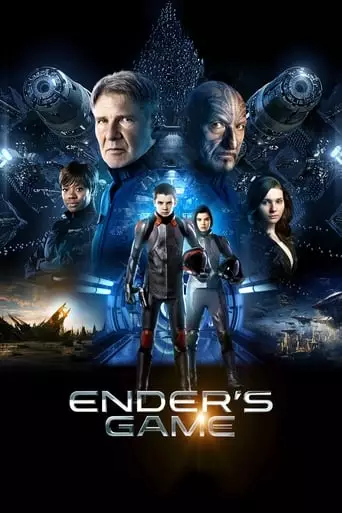
Ender's Game (2013) Watch Online Free
Based on the classic novel by Orson Scott Card, Ender’s Game is the story of the Earth’s most gifted children training to defend their homeplanet in the space wars of the future.
Ender’s Game is a 2013 science fiction film directed by Gavin Hood, adapted from Orson Scott Card’s 1985 novel. The story is set in a future where Earth has narrowly survived an invasion by an alien species known as the Formics. To prepare for potential future attacks, the International Fleet recruits gifted children to train as military commanders. The protagonist, Andrew Ender Wiggin (Asa Butterfield), is selected for his exceptional strategic mind and sent to Battle School, a space station where he undergoes rigorous training.
At Battle School, Ender faces intense simulations and challenges designed to test his leadership and tactical abilities. He quickly rises through the ranks, earning the trust of his superiors, including Colonel Graff (Harrison Ford) and Major Anderson (Viola Davis). Ender’s final test culminates in a simulated battle against the Formics, where he employs unconventional tactics to achieve victory. However, he later discovers that the simulation was real, and his actions led to the destruction of the Formic homeworld, resulting in the extinction of an entire species. This revelation forces Ender to confront the moral implications of his actions and the true nature of the war he has been trained to fight.
Ender’s Game delves into the moral complexities of warfare, particularly the manipulation of children for military purposes. The film questions the justification of using young minds as instruments of war and the ethical boundaries of training individuals to become leaders in such a context. Ender’s journey highlights the internal conflict between duty and morality, as he grapples with the consequences of his actions.
Ender’s ascent to leadership is marked by profound isolation. His exceptional abilities set him apart from his peers, leading to loneliness and a lack of genuine connections. This theme explores the psychological toll of leadership, emphasizing the sacrifices and emotional challenges that accompany positions of power and responsibility.
The film portrays the Formics as a faceless enemy, reflecting the human tendency to dehumanize adversaries during conflict. This dehumanization facilitates the justification of extreme measures, such as the annihilation of an entire species. Ender’s realization of the Formics’ true nature challenges this perspective, prompting a reevaluation of the ethics of war and the importance of understanding the enemy.
Ender’s journey is also one of self-discovery, as he uncovers truths about his origins and the true purpose of his training. This theme examines the search for identity and the impact of external influences on personal development. Ender’s evolution from a manipulated child to an individual aware of his autonomy underscores the importance of self-awareness and the quest for personal truth.
Upon its release, Ender’s Game received mixed reviews from critics. While some praised its visual effects and the performances of the cast, others criticized its pacing and the challenges of adapting a complex novel into a feature film. Roger Ebert’s website noted that the film packs too much plot into 114 minutes and has serious pacing issues, suggesting that the adaptation struggled to capture the depth of the original material.
Despite these critiques, the film has been recognized for its thought-provoking themes and its exploration of the moral complexities of war. It has sparked discussions about the ethics of using children in military training and the psychological effects of leadership under extreme circumstances. The film’s impact extends beyond entertainment, serving as a catalyst for conversations about the morality of warfare and the human cost of conflict.
After watching Ender’s Game, you may feel a mix of awe and contemplation. The film’s intense action sequences and futuristic visuals may leave you feeling exhilarated, but the deeper moral and psychological themes will likely linger in your mind. The ethical dilemmas faced by Ender, especially regarding the manipulation of children in warfare, may provoke a sense of discomfort or moral questioning. You might find yourself reflecting on the nature of leadership, the cost of war, and the human tendency to dehumanize enemies in times of conflict.
The revelation of the Formics’ true nature at the end of the film may leave you with a sense of regret and guilt, as Ender himself feels. This emotional weight could make you question the consequences of actions taken in the heat of war and the importance of understanding those we consider enemies. Overall, you may feel conflicted—appreciating the film’s action and visual spectacle, but also deeply moved by its exploration of the psychological toll of war and the moral choices individuals must make.
